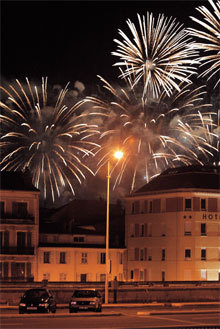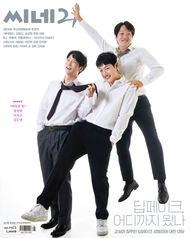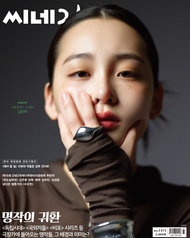영화제는 시간당 최대한 많은 양의 제품을 관객 앞으로 옮겨다주는 컨베이어벨트와 같이 돼야 하는 것일까, 아니면 비슷한 생각을 가진 사람들이 열정을 공유하고 ‘서서 응시하는’ 시간을 가질 수 있는 좀더 사교적인 행사가 돼야 하는 것일까? 가장 오래된 영화제들은 후자처럼 시작했다. 대부분은 이제 전자처럼 변종했다. 베니스영화제는 호텔 잔디밭에서 저녁 식사 뒤 갖는 상영회의 일련으로 시작했다. 비슷한 방식으로 로카르노영화제는 한때 그랜드 호텔 뒤 자연적으로 기울어진 화원을 사용했었다. 베를린영화제는 원래 야외 그리스식 극장에서 상영회를 가졌고, 처음 27년 동안은 추운 겨울의 사무적인 2월이 아니라 온화하고 축제 같은 분위기의 6월에 열렸다.
칸영화제조차 좀더 부유한 사교 행사로 시작했고, 원래는 (지금처럼 이른 여름이 아니라) 가을에 열렸고, 팔레라는 전용 극장도 없었다. 1946년 9월, 첫 개막식 밤, 지방 기자가 쓰길, “우리는 이렇게 많은 사람들이 영화에 관심이 있으리라 생각지 못했다. 모두들 밀면서 들어가서는 닥치는 대로 자리를 잡아챘다.”
여전히 영화제에서 밀고 잡아채는 일은 충분히 많다. 그런데 관객이 변했다. 적어도 오래된 편인 서구영화제에서는 그렇다. 이들은 지나가는 기차의 번호를 받아적는 트레인스포터들처럼 영화 제목들을 냉정하게 축적할 뿐이다. 모두에게- 관객이든 업계 상인들이든- 영화제는 그저 비즈니스일 뿐이다.
하지만 동아시아와 동유럽은 예외다. 동아시아에서는 영화제들이 상대적으로 새로운 현상에 속하고, 동유럽에서는 순수하게 자유로운 영화제는 상대적으로 최근에 나타난 것이다. 필자의 경험으로 두 지역의 관객에게선 아직 명백한 호기심과 아량과 탐구 및 음미의 정신을 감지할 수 있었다. 7월 초 개최되는 카를로비 바리 영화제는 새로운 국가에서 열리는 오래된 행사다. 한때 착실한 공산주의 전시장으로, 모스크바와 한해씩 번갈아가며 개최됐던 이 영화제는 이제 젊고 자주적인 체코공화국의 젊고 발랄한 표상이 됐다. 관객은 자동차로 90분 떨어진 프라하에서 이 아름다운 광천수 휴양지로 몰려든다. 여러 면에서 세계에 정착한 영화제 중 가장 친절하고, 태평스럽고, 아름답게 위치를 잡은 영화제다.
필자는 매년 유러피안 필름 프로모션(EFP)과 본인이 속한 업계지가 후원하는 ‘버라이어티 크리틱스 초이스’(Variety Critics’ Choice)라는 섹션을 코디네이팅하기 위해 참가한다. 이 섹션은 주로 처음 또는 두 번째 작품을 낸 감독의 작품들로 우리가 생각하기에 조금 간과했다 싶은 유럽영화 10편을 직접 선정한 것으로 이루어진다. 사흘 동안 우리는 저녁 만찬과 파티에 모이고, 상영회 뒤 질의응답 시간을 진행하고(모두 매진됨), 분위기를 즐긴다. 감독들은 서로를 알게 되고, 서로의 영화를 볼 기회도 누린다.
<버라이어티> 행사말고도 올해에는 홍상수 감독을 느긋한 상황에서 알게 될 시간이 있었다. 2년 전 이 영화제는 홍 감독 작품을 추대하는 행사를 가졌는데, 이제 본 심사위원단 위원으로 돌아온 것이었다. 우리는 둘 다 각각의 직업에서, 그저 그곳 공기를 들이마시면서, 잠깐 동안 “서서 응시하는” 그 기회를 만끽했다. 그때 한번만은 비즈니스가 아니었던 것이다.
Putting the "festival" back into "film festival"
By DEREK ELLEY
Should film festivals be just conveyor belts, to shift as much product past audiences by the hour, or should they be more social occasions in which the like-minded can share their enthusiasms and take time to "stand and stare"? The oldest festivals began as the latter; most have now morphed into the former. Venice started as a series of post-dinner screenings on the lawn of a hotel; in a similar way, Locarno once used the naturally-sloping garden behind the Grand Hotel; Berlin originally had screenings in an open-air, Greek-style theatre, and for its first 27 years was held in balmy, festive June, not wintry, business-like February.
Even Cannes began more as an upscale social event, originally in the autumn (not early summer, as now), with no dedicated Palais. At the first night, in September 1946, a local journalist wrote: "We never thought so many people would be interested in the cinema. Everyone pushed their way in and grabbed the first available seat."
There's still plenty of pushing and grabbing at festivals. But audiences have changed, at least at the older western festivals: they've become trainspotters, accumulating titles in a dispassionate way. For everyone now - audiences as well as tradesters - it's just a business. Except in East Asia and Central Europe. In the former, film festivals are a relatively new phenomenon; in the latter, genuinely free festivals are relatively recent. In my experience, the audiences in both regions still have a palpable curiosity, generosity, and sense of enquiry and enjoyment. The Karlovy Vary Film Festival, in early July, is an old event in a new country: once a dutiful Communist showcase, alternating every year with Moscow, it's now a youthful banner for the equally youthful, independent Czech Republic. Audiences flock to the beautiful little spa town from the capital, Prague, 90 minutes away by car: in many ways, it's the most friendly, easygoing and beautifully located of the world's established festivals.
I go every year to co-ordinate a section called Variety Critics' Choice, sponsored by European Film Promotion and my own paper: 10 handpicked European films, mostly by first or second-time directors, that we reckon have been slightly overlooked. For three days, we congregate at dinners and parties, do Q&As after the screenings (all sold out), and enjoy the ambience. The directors get to know each other and watch each others' movies.
Outside the Variety event, I had time this year to get to know Hong Sang-soo in relaxed circumstances. A couple of years ago, the festival had a tribute to him; now he was back as a member of the main jury. Both of us, in our separate professions, relished the opportunity just to breathe the air and, for a while, to "stand and stare." For once, it wasn't just business.
-Derek Elley is Senior International Film Critic of <Variety>, the Hollywood-based showbiz paper. He writes here in a personal capacity.




